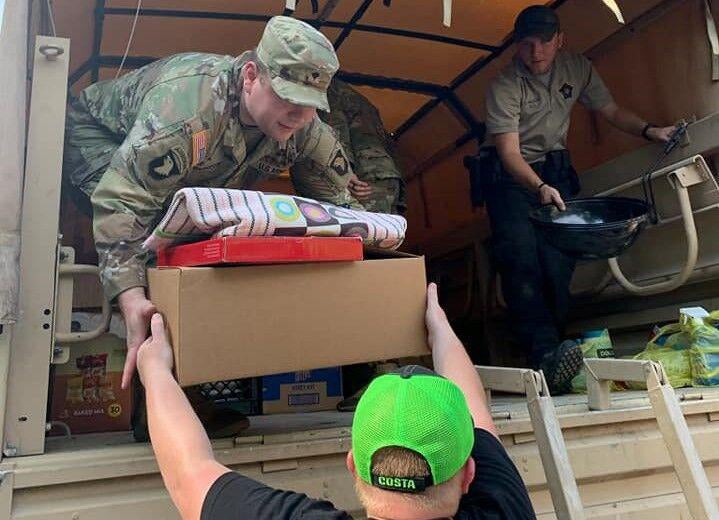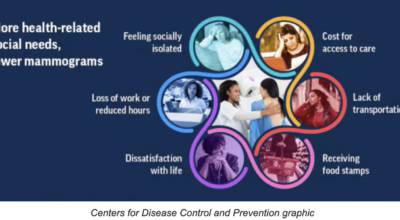Death toll holds steady, relief efforts continue
Published 4:00 pm Thursday, August 4, 2022

- Kentucky National Guard soldiers distributing food, water and other supplies in Hyden, a community in Leslie County. Kentucky National Guard photo
STAFF REPORTS
The loss of life from flooding that began in eastern Kentucky last week remained at 37 on Wednesday, as focus shifts from search and rescue to restoring services and helping people put their lives back together.
In response, Gov. Andy Beshear has dispatched the Kentucky National Guard to the affected area.
More than 400 National Guard troops have been sent to the area, fulfilling a variety of roles, including search and rescue missions, assisting local law enforcement and delivering water, since many areas had their water service disrupted and facilities destroyed.
A total of 2,404 cases of water had been delivered as of 8 a.m. Wednesday, Beshear said. “But I guarantee there will be a lot more, as we’re moving water as fast as we can.”
The weather remains a concern in the area, but now the concern is heat, not rain.
Daytime temperatures in the 90s and humid conditions, it feels a lot hotter than the temperature indicates, and that is a problem for people with not enough water and no electricity.
“The biggest concern we have is the weather,” Beshear said. “It is very, very hot. Highs are to be in the 90s. Combined with the humid airmass, it’s going to make it feel much hotter. The heat index will be over 100 degrees at some locations, that’s why we set up eight cooling centers in those areas. If you don’t have power, if you don’t have a cool place to be, go to one of the centers.”
The cooling centers are located in Breathitt, Floyd, Johnson, Knott, Letcher, Perry, Pike and Wolfe counties.
A week after floodwaters consumed parts of Appalachia, rescue missions were winding down while supplies poured into what looms as a massive relief effort. Floodwaters wrecked homes and businesses, and some escaped the surging waters with only the clothes they wore.
In Breathitt County, plans were made to deliver supplies by foot in areas where roads were washed out.
More than 1,300 people were rescued and crews were still trying to reach some people cut off by floods or mudslides. About 5,000 customers still lacked electricity in eastern Kentucky, the governor said. Emergency shelters and area state parks housed hundreds of residents who fled homes that were destroyed or badly damaged. Many more are staying with relatives and friends.
While hundreds of people had initially been reported missing in the 13 flood-ravaged counties, people were encouraged to call the Kentucky State Police post in their loved ones’ area so troopers could check on them due to electric and cell phone outages. As a result of over 1,000 wellness checks, as well as power and cellphone service restoration efforts, Beshear said the number is now down to three.
“We are very concerned about them,” he said. “All three are females in Breathitt County.”
Initial expenditures from a relief fund opened by the governor were being distributed to pay funeral expenses of flood victims.
While there were over 30,000 people without power at the height of the flooding, the Governor said that number is now down to 5,068. The biggest remaining outages are 1,460 in Breathitt County, 1,068 in Knott County and 2,268 in Perry County.
Transportation Cabinet crews have inspected 84% of the nearly 1,100 bridges in the affected area. Of the 21 bridges that are still impassible, four are state bridges and 17 are county bridges. While state roads have been cleared, Beshear says the Cabinet is helping on county roads, with crews coming from as far away as Paducah.
Due to the extent of damage, the governor says he has been talking with state lawmakers about a special session to appropriate recovery funds, since the state had a nearly $1 billion surplus for the fiscal year that ended on June 30, plus more than that amount unspent in the two-year state budget the General Assembly approved in the spring.
“I anticipate that is something we will need,” he said, “and that we will work out ahead of any special session. We are going to need a package like the SAFE Act.”
That was enacted by the legislature to help recover from the deadly December tornado outbreak in western Kentucky last year.
Beshear also said the increased law enforcement presence has led to a reduction of looting in the affected area.
“To loot, to steal from people who have lost everything is the worst of humanity, and it’s hard to believe someone would go so low as that. It’s the same with scamming. Folks don’t have money, and to take what little they have is horrendous. We will not allow it; law enforcement will catch and prosecute any looters to the fullest extent of the law. Listen, if you know our state and our folks, maybe you’re lucky if it’s law enforcement that finds you, if you’re willing to stoop that low.”






